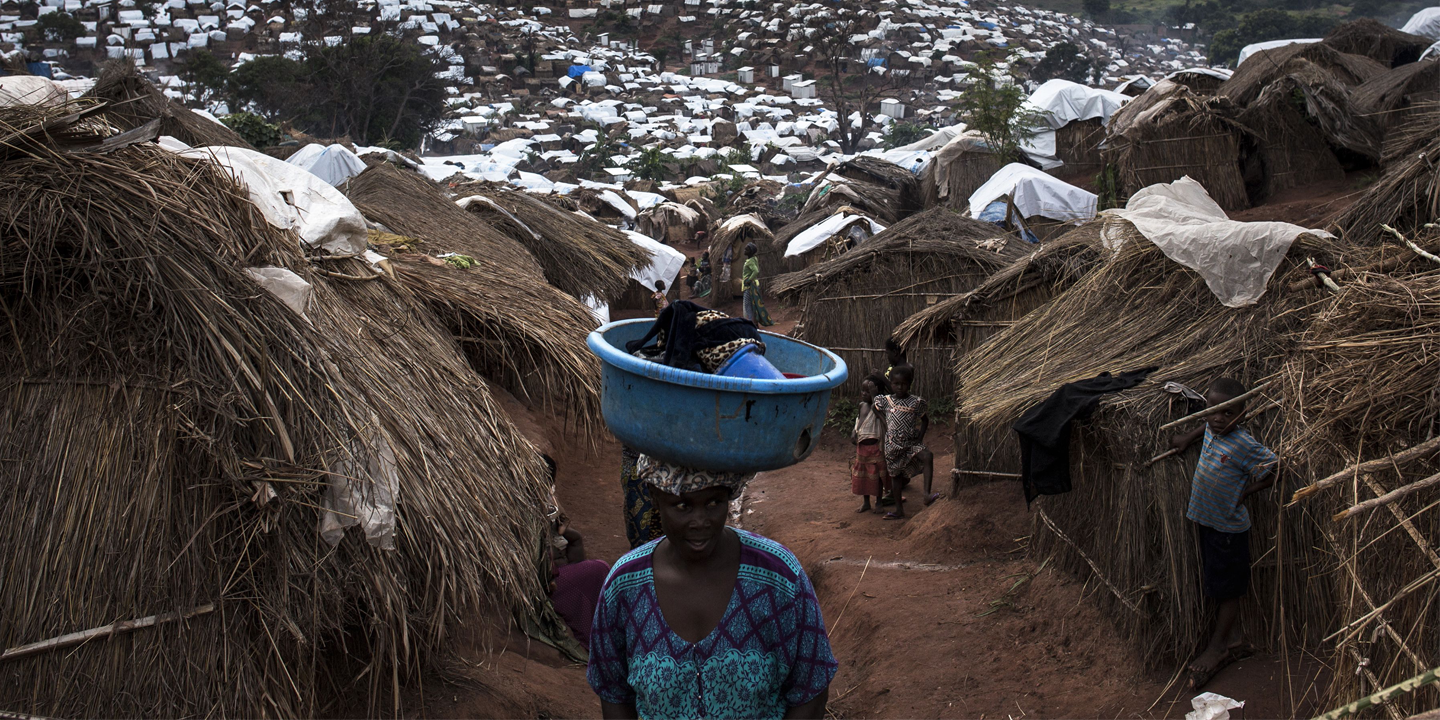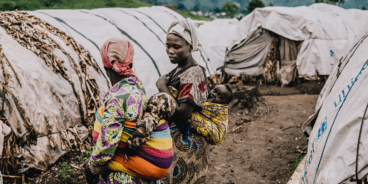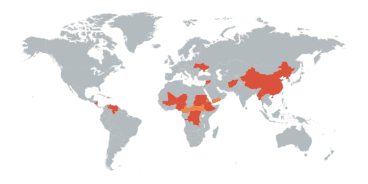

Atrocity Alert No. 209: UN Refugee Global Trends Report, Afghanistan and Cameroon
Atrocity Alert is a weekly publication by the Global Centre for the Responsibility to Protect highlighting situations where populations are at risk of, or are enduring, mass atrocity crimes.
1% of humanity has now been forcibly displaced
Last Saturday, 20 June, the international community observed World Refugee Day. Ahead of the commemoration, the UN Refugee Agency (UNHCR) published its annual report on Global Trends in Forced Displacement, noting that by the end of 2019 at least 79.5 million people (1 in every 97 people) had been displaced by “persecution, conflict, violence, human rights violations or events seriously disturbing public order.” This included over 45.7 million people who were internally displaced. Forty percent of those displaced are under the age of 18.
The total displacement number marks an increase of almost 10 million people since 2018. As in previous years, the Global Trends report also provides evidence of the close connection between atrocity crimes and mass civilian displacement. More than 68 percent of refugees come from just five conflict torn countries – Syria, Venezuela, Afghanistan, South Sudan and Myanmar – where various state actors and/or non-state armed groups have perpetrated crimes against humanity or war crimes.
Despite UNHCR recording a large number of returnees to the Democratic Republic of the Congo, by the end of 2019 there was still a record five million people internally displaced in the country. This includes 1.3 million people displaced by inter-communal violence between the ethnic Hema and Lendu communities. Although it was not one of UNHCR’s “top” crises, ongoing attacks by armed groups in the Sahel have also resulted in a terrifying increase in displacement in Burkina Faso, where more than 560,000 people were internally displaced by the end of 2019 as compared to only 47,000 in 2018.
Displaced populations are particularly vulnerable to sexual and gender-based violence, exploitation and abuse. They require urgent humanitarian assistance and usually suffer significant long-term socio-economic disadvantages. These vulnerabilities have been exacerbated by the current COVID-19 pandemic.
With 79.5 million people now displaced by persecution, atrocities and conflict, displacement today is nearly double the 41.1 million people who were displaced a decade ago. The UN High Commissioner for Refugees, Filippo Grandi, noted that, “we are witnessing a changed reality in that forced displacement nowadays is not only vastly more widespread but is simply no longer a short-term and temporary phenomenon.”
The soaring displacement numbers of the past decade demonstrate the need to confront intractable conflicts, protect vulnerable populations, and find solutions that enable the safe, voluntary return of all displaced populations to their places of origin.
Attacks on healthcare in Afghanistan despite COVID-19
On 21 June the UN Assistance Mission in Afghanistan (UNAMA) released a special report on attacks on healthcare in Afghanistan since 11 March, the date when the World Health Organization declared COVID-19 to be a global pandemic.
The Taliban were responsible for eight deliberate attacks on healthcare personnel or facilities between 11 March and 23 May, including the abduction of healthcare workers and an attack on a pharmacy. Meanwhile the Afghan National Security Forces (ANSF) carried out three deliberate attacks, including targeting a healthcare facility, medical workers, and the delivery of medical supplies. Unknown gunmen also perpetrated an attack on a maternity ward in a hospital in Kabul during May, killing 24 civilians, including newborn babies and their mothers. No one has claimed responsibility for the attack.
Deliberate attacks against healthcare personnel and facilities during armed conflict are prohibited under International Humanitarian Law (IHL) and constitute war crimes. Deborah Lyons, Head of UNAMA, said: “At a time when an urgent humanitarian response was required to protect every life in Afghanistan, both the Taliban and Afghan national security forces carried out deliberate acts of violence that undermined healthcare operations. There is no excuse for such actions; the safety and well-being of the civilian population must be a priority.”
UNAMA has also reported an alarming increase in civilian casualties since the signing of the United States-Taliban peace agreement during February. Both the Taliban and the ANSF have escalated operations, and during April alone the Taliban were responsible for 208 civilian casualties while the ANSF were responsible for 172.
Despite an increase in hostilities, there is a possibility that intra-Afghan negotiations, hosted by Qatar, may begin in the near future. While peace talks are a welcome step towards ending the war in Afghanistan, the recent increase in attacks on healthcare facilities demonstrates a fundamental lack of respect for international law. All parties to the conflict in Afghanistan must end attacks on civilians and be held accountable for the commission of war crimes.
Urgent call for ceasefire in Cameroon amid COVID-19 pandemic
On 22 June five Nobel Peace Prize Laureates, along with two former heads of state and other notable world leaders, called upon all parties to the conflict in the Anglophone regions of Cameroon to declare a humanitarian ceasefire amid the COVID-19 pandemic. The Global Centre for the Responsibility to Protect also signed the ceasefire challenge.
With more than 12,000 confirmed COVID-19 cases and 300 deaths, Cameroon is one of the hardest hit countries on the African continent. A ceasefire would facilitate access for lifesaving medical aid and other forms of humanitarian assistance, including improved COVID-19 testing as the virus continues to rapidly spread.
The ceasefire call by the world leaders emphasizes that COVID-19 cannot be properly confronted while infrastructure is being attacked, populations are displaced, and medical aid cannot reach all parts of the north-west and south-west regions. Since March, when Cameroon confirmed its first COVID-19 case, armed separatist groups and the Cameroonian armed forces have continued to clash in the Anglophone regions, and all but one armed separatist group have ignored the UN Secretary-General’s call for a ceasefire. The large internally displaced population is at heightened risk of contracting COVID-19 because of limited access to healthcare facilities.
Since October 2017 more than 2,000 people have been killed and 700,000 displaced as a result of an ongoing conflict over cultural rights and identity in the Anglophone regions. There is extensive evidence of security forces perpetrating extrajudicial killings, burning villages and torturing individuals with alleged separatist sympathies. Armed separatist groups have also perpetrated human rights abuses, including kidnapping and killing civilians.
During an interview with Deutsche Welle Africa, Dr. Simon Adams, who signed the ceasefire call on behalf of the Global Centre for the Responsibility to Protect, said that “adherence to the global ceasefire is not the final step. First, parties to the conflict need to drop their guns before we can move towards a more lasting resolution to the conflict and bring an end to the atrocities that have taken place for more than three years.”
Despite three years of armed conflict, Cameroon remains one of the most neglected human rights and displacement crises in the world. The country is now facing the additional threat of a major COVID-19 outbreak. Now is the time for both the UN Security Council and the African Union to support the ceasefire call and help negotiate an end to the catastrophic armed conflict in the Anglophone regions.

